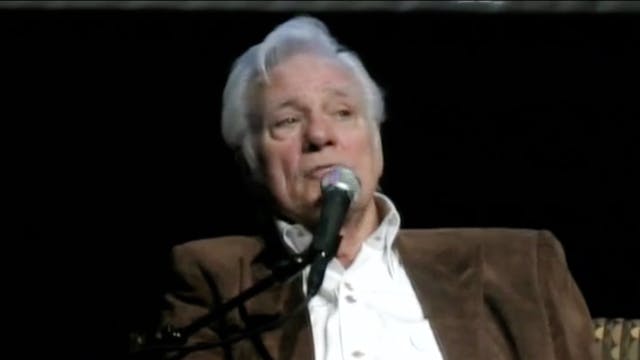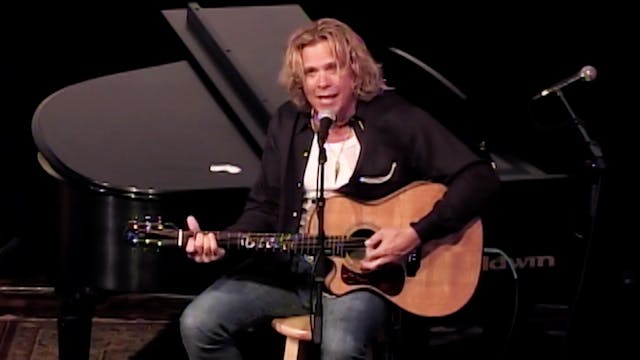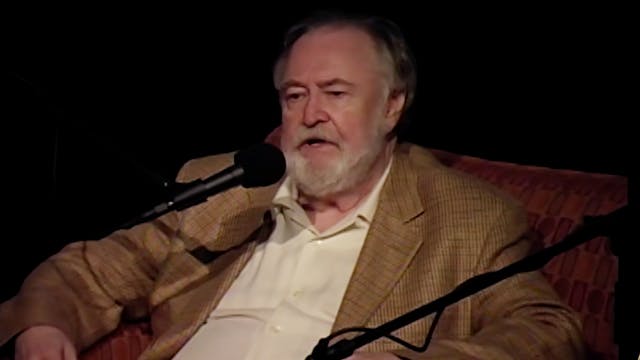Jerry Chesnut • Poets and Prophets, 2009
Poets and Prophets
•
1h 34m
Jerry Chesnut—the songwriter behind classic country hits including “A Good Year for the Roses” and “It’s Four in the Morning”—shares detailed, often funny stories about his work and his career during this September 26, 2009, program, part of the Country Music Hall of Fame and Museum’s Poets and Prophets series.
Early in the program, host Michael Gray asks Chesnut about writing “They Don’t Make ’Em Like My Daddy,” which became a hit for Country Music Hall of Fame member Loretta Lynn in 1974. The songwriter speaks about his own hardworking father, whose jobs ranged from hauling logs to being a butcher, and notes that while he very seldom wrote hits specifically for an artist, he’d felt compelled to write that particular song for Merle Haggard. Bonnie Owens suggested it, telling Chesnut that Haggard loves songs about Mama and Daddy, the Depression, and hard times.
“I had no problem with getting lines for all that,” says Chesnut, who grew up poor in Harlan County, Kentucky, “because I had been through that.”
Chesnut describes his musical beginnings, listening to WSM’s “Grand Ole Opry” from Nashville and WNOX’s “Midday Merry-Go-Round” from Knoxville, and finding an interest in guitars after his brother received one for Christmas.
Shortly before the start of the Korean War, Chesnut joined the U.S. Air Force, playing guitar and performing country songs on naval ships and military bases during his four years in the service. He also sang during programs hosted by radio station KFRE in Fresno, California, while stationed nearby. Hank Thompson’s song “The Wild Side of Life” was a popular request, and performing it prompted Chesnut to consider writing a song for Thompson himself.
After leaving the service, Chesnut moved to St. Augustine, Florida, and found a band to join. There, he worked for a supervisor with the last name Oney—the inspiration for one of Chesnut’s famous songs, Johnny Cash’s “Oney,” about a man who worked for a tough boss. From Florida, Chesnut decided to take his chances in Nashville.
Jerry Chesnut logged his first hit in 1967, when Del Reeves recorded “A Dime at a Time.” Reeves then cut Chesnut’s “Looking at the World Through a Windshield.” That success led to hits including Jerry Lee Lewis’s “Another Place, Another Time,” and Porter Wagoner & Dolly Parton’s “Holdin’ on to Nothin’.”
Chesnut shares how a conversation at the garden center inspired “A Good Year for the Roses,” a #2 hit for George Jones that was released at the end of 1970, and how, around the same time, “getting these lines from God or somewhere” led to “The Wonders You Perform,” recorded by Tammy Wynette.
In 1974, Elvis Presley cut Chesnut’s “It’s Midnight,” which became a Top Ten hit and led to a fruitful relationship between the two late in the superstar’s career.
When Jerry Chesnut wrote “It’s Four in the Morning,” a #1 hit for Faron Young in 1972 (also recorded by Elvis Costello for 1981’s “Almost Blue”), he only had to look to his watch for inspiration. For most of his career, he says, he rose before dawn to write, while his mind was fertile.
“I’ve written great songs after ten a.m., but they weren’t hits,” Chesnut says. “I’ve never written a hit after ten o’clock in the morning.”
FOR MORE
Explore the Museum’s public programming: https://countrymusichalloffame.org/plan-your-visit/exhibits-activities/public-programs/
FOLLOW THE MUSEUM
Instagram: https://www.instagram.com/OfficialCMHOF/
Facebook: https://www.facebook.com/countrymusichof/
Twitter: https://twitter.com/countrymusichof
Up Next in Poets and Prophets
-
Jerry Foster • Poets and Prophets, 2011
Jerry Foster—who, as a member of renowned songwriting team Foster and Rice, delivered country hits for stars including Charley Pride, Jerry Lee Lewis, and Johnny Paycheck—surveys his career and creative partnership with Bill Rice during a September 10, 2011, conversation at the Country Music Hall...
-
Jeffrey Steele • Poets and Prophets, ...
Hit songwriter Jeffrey Steele performs signature hits like “My Wish” and “What Hurts the Most” and talks about his songwriting process and inspiration during this September 27, 2008, program, part of the Country Music Hall of Fame and Museum’s songwriting-focused Poets and Prophets series.
Steel...
-
Hank Cochran • Poets and Prophets, 2007
Hank Cochran gives a spirited interview about his long career as a songwriter—with anecdotes about Willie Nelson and Patsy Cline, as well as stories behind country classics including “Don’t Touch Me” and “Ocean Front Property”—during a Poets and Prophets program at the Country Music Hall of Fame....



